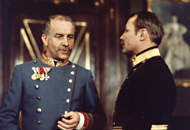Authenticity is a difficult quality to identify in any of "Colonel Redl"'s characters or the posts they assume. Redl's reverence for the emperor Franz Josef is itself built upon the fallacy of myth and deification, as evidenced by the rearing he experiences in military school. Because his lot in life was determined by the charity of the empire, the viewer is constantly reminded that Redl's deeds and loyalty spring from a well of gratitude for a man he has never met and an empire whose nature he childishly understands. It is once he is exposed to the bureaucracy and deceptive nature of the general staff that the true nature of the empire's inner workings is revealed and Redl's own sense of identity begins to fail him. In his unflagging devotion to the antiquated and romanticized morals of the imperial age Redl is incapable of reconciling his ideals with reality, of both his own nature and the reality of Austria. His love of the Empire is authentic, yet they Empire is not, and there lies the tragedy.
skip to main |
skip to sidebar

Franz Ferdinand and Alfred Redl
Blog journal coffeehouse & other resources for the UW Germanics Winter Quarter '08 Vienna 1900 course. Professor: Heidi Tilghman, TA: Elisabeth Cnobloch
Question for Week of March 10, 2008
Please view the photo of Colonel Redl and Franz Ferdinand as portrayed in Istvan Szabo's film "Oberst Redl" (below). As we discussed briefly in class, Franz Ferdinand is portrayed as the polar opposite of Franz Josef, the Emperor whom Redl loved. Yet in order to serve the Empire which he loves, he has to do Franz Ferdinand's bidding. This political bind becomes a moral bind for Redl that derives its power from his own identity crisis as well as the identity crisis of Franz Ferdinand (who is not emperor but who acts like it) and indeed the entire Empire. Unravel this mess! Who can be called "authentic" in this film?
Colonel Redl

Franz Ferdinand and Alfred Redl
Question for the week of February 22
Dream Story on the Couch
The connection between Schnitzler’s Dream Story and Freud’s psychoanalysis is obvious as well as the connections are numerous. Give an example and analyze it.
The connection between Schnitzler’s Dream Story and Freud’s psychoanalysis is obvious as well as the connections are numerous. Give an example and analyze it.
Question for the week of February 15, 2008
Explore Schnitzler’s “Reigen” in regards to death, sexuality, and power (structures).
Question for February 8, 2008
Think about the role music plays in The Man without Qualities. What´s going on when Walter and Clarisse sit down at the piano? Explore this question further and connect it with our discussions and presentations in class.
Question for February 1, 2008
What is Hofmannsthal's Lord Chandos upset about? Is this a psychological, aesthetic or ethical crisis? What do you think that Ulrich would have to say to Lord Chandos?
Question for week of January 28
Please follow up on our discussion in class today (Friday, 1-25) Hofmannsthal's "Tale" can be read, of course, for the plot-line, but it gains depth if read also by paying special attention to images or leitmotifs: things like eyes and lips and teeth; colors; qualities of light, etc. Re-read what Janik and Toulmin had to say about Hofmannsthal; look at my study questions and re-read the story. What questions is Hofmannsthal posing in his "Tale"? What sorts of issues are troubling him; what's he worried about? How does he explore these issues and questions? Do any of his questions resonate with issues posed thus far in The Man without Qualities?
Question for the Week of January 21, 2008
Why were people like Kraus and Hofmannsthal so worried about language? What moral dilemmas did they see in language usage? How could a poem lie? Why was it such a big deal?
Question for week of January 14, 2008
Who is Ulrich? What do you think it means to be a man without qualities? How do you make sense of him?
Remember to offer your blog on this question--or on some other topic stemming from the reading and class discussion--by Wednesday midnight. Then please comment on one of the blogs by Friday midnight.
Remember to offer your blog on this question--or on some other topic stemming from the reading and class discussion--by Wednesday midnight. Then please comment on one of the blogs by Friday midnight.


2 comments:
I agree absolutely with your assessment that Redl is loyal to an empire that does not exist. It really is the saddest thing about this film. The end where he realizes that he has to die for this flawed empire is the most heart-wrenching scene in the film. His expression as he paces back and forth, trying to decide how to deal with his emotions is unforgettable. The deification of Franz Josef is most apparent in the scene where the children go to mass to be dedicated to the emperor as his "children”. This was a sad film in so many ways. The real basis to it was the denial of self, leading to the in-authenticity that we see throughout the film.
So would you say that since Redl has an "authentic" love for the empire, that you would consider him the closet to being authentic in the film? In my opinion, I still find so many flaws and contrasting things in Redl that I would have a hard time as viewing him as authentic. what do you think?
Post a Comment